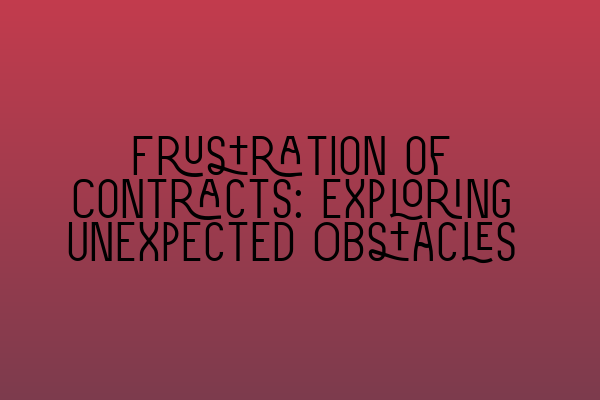Frustration of Contracts: Exploring Unexpected Obstacles
In the constantly evolving world of contract law, it’s not uncommon for unexpected obstacles to arise, leading to frustration of contracts. Whether it’s due to unforeseen circumstances or external factors, these obstacles can cause significant disruptions and challenges for both parties involved. Understanding the concept of frustration of contracts is crucial for solicitors and individuals alike, as it provides insights into the legal implications and potential remedies.
At SQE Contract Law, we believe in equipping our readers with comprehensive knowledge about various legal topics. In this article, we’ll dive deep into the concept of frustration of contracts, exploring its definition, key elements, legal perspectives, and potential solutions. So, let’s get started!
—
What is Frustration of Contracts?
Frustration of contracts refers to a legal doctrine that allows parties to be released from their contractual obligations when an unforeseen event makes it impossible to fulfill those obligations. It serves as a safeguard against unfairness and provides a way to address situations where the initial purpose of the contract has been fundamentally altered.
In order for frustration of contracts to apply, certain criteria must be met. These include:
1. Unforeseen Event: The event must be something that was not contemplated by the parties at the time of contract formation. It could be an external event, such as a natural disaster or government directive, or an internal event, such as the incapacity of a key party involved.
2. Fundamental Change: The event must result in a fundamental change to the contract, making it either physically or commercially impossible to perform. It’s important to note that the change must go beyond mere inconvenience or hardship.
3. No Fault: The event must be beyond the control of any of the contracting parties. The doctrine of frustration of contracts is not applicable when a party willingly creates the circumstances leading to the frustration.
—
Legal Perspectives on Frustration of Contracts
From a legal perspective, frustration of contracts is based on the principle of fairness and the desire to prevent unjust outcomes. Courts consider various factors when determining whether frustration of contracts should apply in a given situation. These factors include:
1. Nature of the Contract: The nature and purpose of the contract are crucial in assessing whether frustration is applicable. For example, if the contract involves the performance of a specific person who becomes incapacitated, frustration of contracts may be more likely to apply.
2. Allocation of Risk: Courts examine how the risk of the frustrating event was allocated in the contract. If the event was expressly contemplated and the parties agreed to allocate the risk in a certain way, frustration of contracts may not be applicable.
3. Availability of Alternatives: Courts also consider whether there are alternative methods of performance or other contractual provisions that can address the frustrating event. If alternative solutions are available, frustration of contracts may not be a viable option.
—
Potential Solutions and Remedies
When a contract is frustrated, it does not automatically terminate. Instead, it becomes void and the parties are relieved from further performance. However, the consequences of frustration can vary depending on the circumstances and jurisdiction. Here are some potential solutions and remedies:
1. Termination: Both parties are discharged from their obligations, and any money or property exchanged is usually returned.
2. Restitution: If money or property has been provided by one party to the other, restitution may be necessary. This ensures that parties are returned to their pre-contract positions to the greatest extent possible.
3. Compensation: In certain cases, compensation may be awarded to one party if the other party has benefited from the contract before frustration occurred.
It’s important to note that frustration of contracts is a complex legal area, and seeking professional advice from a solicitor is highly recommended.
—
In Conclusion
Navigating unexpected obstacles in contracts can be a daunting task. Frustration of contracts provides a legal framework for addressing these obstacles when they arise. By understanding the concept, key elements, and potential solutions, individuals and solicitors can make informed decisions and seek appropriate remedies.
For more articles on various legal topics, check out our related articles:
– Unveiling Real-Life Case Studies: Insights into Legal Practice and Decision-Making
– Exploring Solicitor Salaries in the UK: Average Earnings and Factors Affecting Income
– Mastering Client Relationship Management: Skills for Solicitors to Enhance Trust and Loyalty
– Pursuing a Law School Education in the UK: Choosing the Right Path for Your Future
– Securing Training Contracts: A Roadmap to Becoming a Solicitor
Your understanding of frustration of contracts and your ability to navigate this legal landscape can make a significant impact on your personal or professional endeavors. Stay informed, seek guidance when needed, and remember that at SQE Contract Law, we’re here to help you every step of the way.
